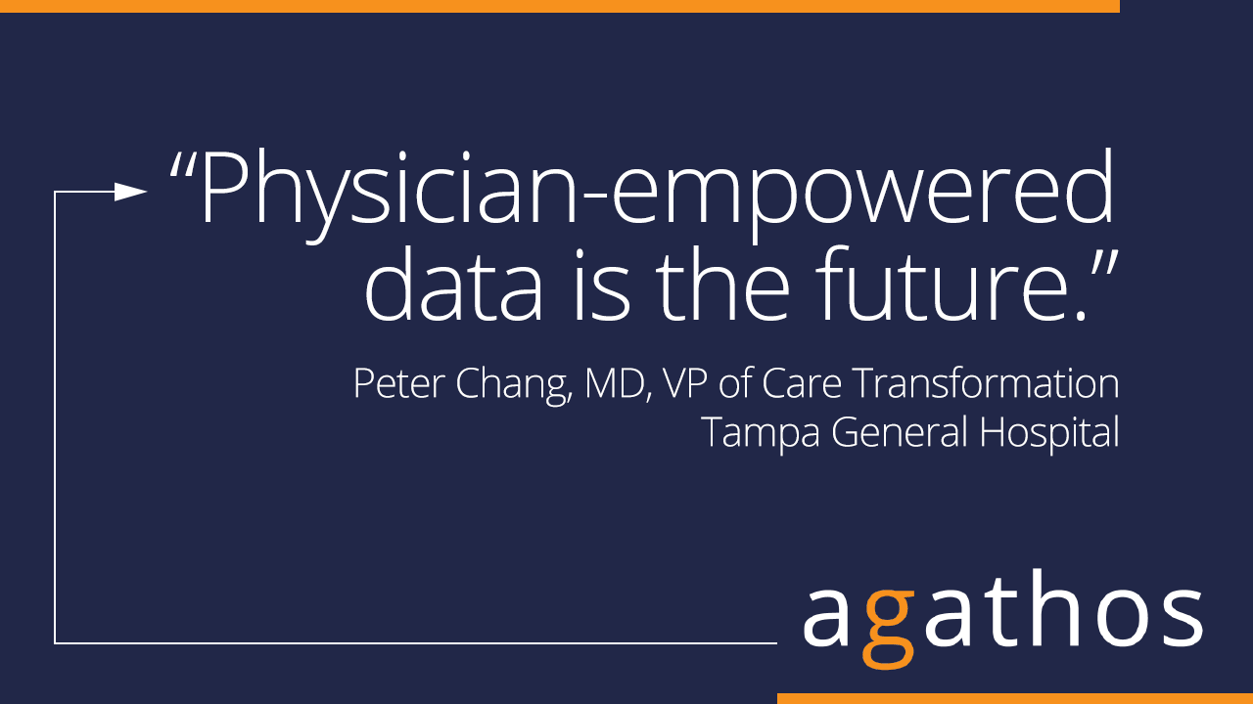DATA TRANSPARENCY, LENGTH OF STAY, BEHAVIOR CHANGE — THIS WEBINAR COVERED IT ALL
- John "JP" Pollard
- 12/20/2021
When we invited William Carracino, MD, CMIO of Lee Health and Peter Chang, MD, VP of Care Transformation at Tampa General Hospital to share how they are empowering physicians with data about their individual practice patterns, we knew we were in for a treat.
Couldn’t make it? No problem. We recorded the webinar so you can relive every bit of wisdom that these two generously shared. Click here to watch.
Interested in the highlights? Read on.
What doesn’t work in getting physicians to engage with data?
Carracino shared a number of initiatives that Lee Health had previously explored. Those initiatives spanned data committees, self-serve data, a variety of analytics tools, dashboards, and other non-Epic workflows. In all cases, physician engagement was extremely low.
What worked in getting physicians to engage with data?
Lee Health shifted focus to a solution that works like this:
- Sends texts messages with personalized data to physicians; Chang later called this a “push” (vs. “pull”) approach
- Transparently shows each physician where they fall in relation to their peers, all unblinded (taking advantage of natural physician competitiveness)
- Offers physicians data that they can respond to with specific actions/changes
In their initial roll out of this approach, Lee Health saw 80% of participating physicians engaging with their data, and the organization saw an ROI of greater than 100% in the first six months.
What kinds of data do physicians trust?
Speaking of his experiences at Tampa General Hospital, Change emphasized that the data presented to physicians must be impeccably accurate. Chang suggested this approach:
- Use clinical data (e.g., from Epic Clarity database), not billing data
- Ensure accurate attribution — Use the note-taking, ordering, admitting, authorizing, or discharging provider, depending on the context
- Share case examples — Point physicians to recent examples relevant to the insight and allow for feedback to Agathos (about the data provided)
Data transparency can decrease length of stay
Both Carracino and Chang shared their journeys in delivering data to physicians and the types of results they were able to produce—results such as reducing both length of stay and accelerating changes in physician practices for a variety of metrics. Chang explained that Tampa General Hospital had saved 15,335 inpatient days since they went live with Agathos in 2019. Of those saved inpatient days, 3,067 are directly attributed to Agathos.
The future of clinical data and clinical variation
After running through all the charts and results, Carracino and Chang engaged in a lively discussion on the future of clinical data and how their efforts are just the beginning of making a real difference in reducing clinical variation.

Chang admitted, “we manage 20% standardization and 80% variation, but to become a high reliability organization, that really needs to flip the other way.”
Perhaps Chang summed it up best in his closing remarks: “Physician-empowered data is the future.”
Click below to watch a replay of the webinar and let us know how you see the future of physician data in tackling clinical variation.
About Author

John "JP" Pollard
JP has over 25 years of marketing experience ranging from executive and product management roles to leadership at award-winning agencies. He has marketed for American Airlines’ SABRE division, SAP’s Germany-based services organization, and also for startups in supply chain technology and healthcare. Prior to joining Agathos in October 2021, JP was VP of marketing for healthcare consulting firm Nordic Consulting Partners (now Nordic Global).


